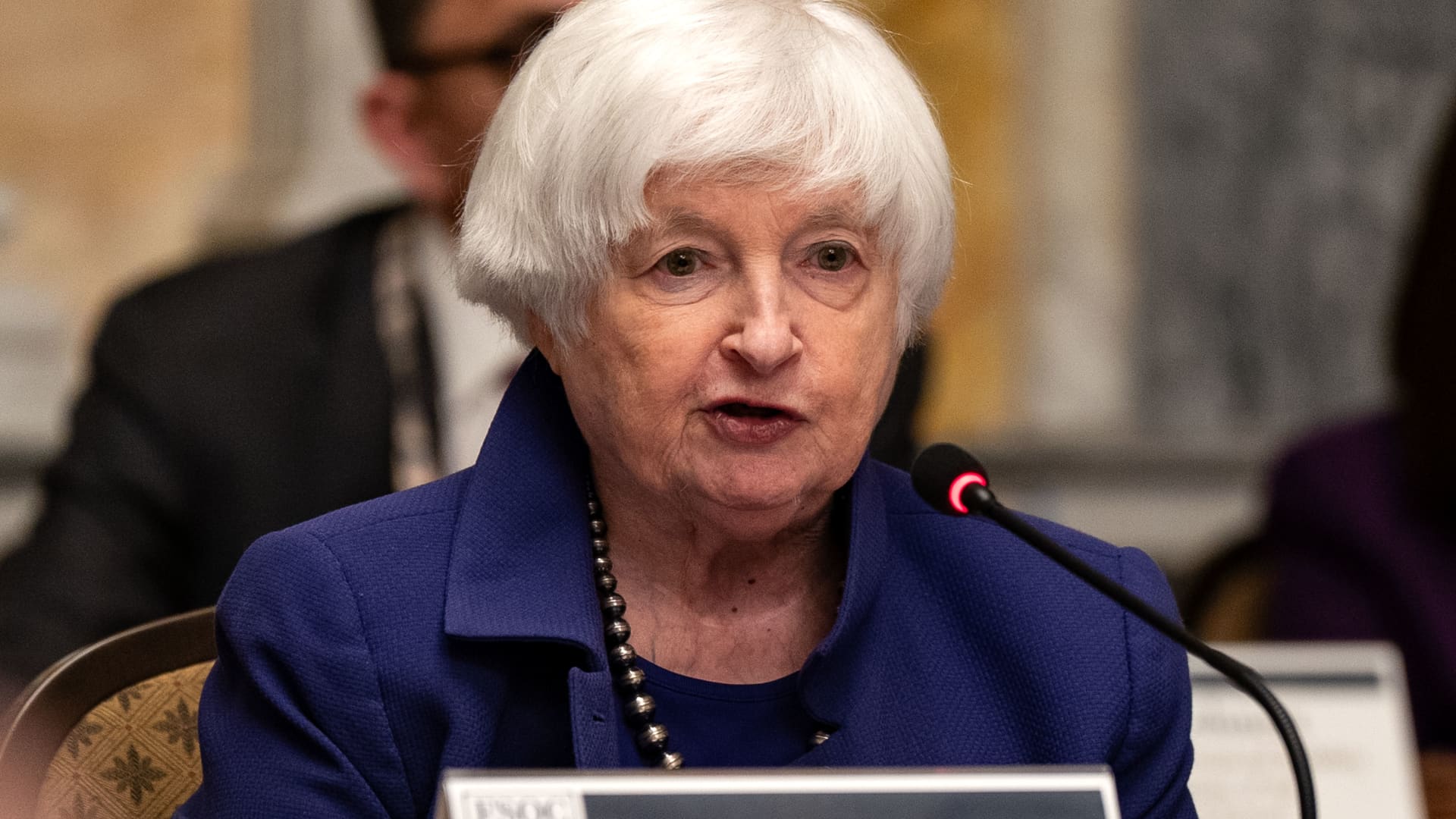People sit on an unusually high bench at the sunset in Copenhagen, on May 9, 2023. The height of a dozen public benches across Denmark was increased by 85 cm to draw attention to climate change. According to the World Climate Research Programme, the high-end global mean sea-level rise is now projected to be up to 1.3-1.6 meters for strong warming by 2100.
Sergei Gapon | Afp | Getty Images
The world’s happiest countries are pressing ahead with plans to achieve more than just net zero emissions — even in the face of an intensifying green political backlash on both sides of the Atlantic.
Finland and Denmark are both targeting “net-negative emissions,” which scientists say can be achieved when the amount of carbon dioxide drawn out of the atmosphere is greater than the amount that’s emitted.
If realized, the two Nordic countries would not only stop contributing to the climate crisis, but would be actively helping to slow the pace of global warming.
Finland, which was recently crowned the world’s happiest country for the seventh successive year, has enshrined what is considered one of the world’s most ambitious climate targets into law. It is aiming to be the first high-income country to reach net zero emissions in 2035 and net negative by 2040.
Denmark, which the World Happiness Report recognized as the world’s second-happiest country, is targeting net zero by 2045 — and net negative by 2050.
Belgian farmers protest in the EU district as European Agriculture Ministers met, on March 26, 2024 in Brussels, Belgium. The farmers were demonstrating against free trade agreements, new environmental rules and the administrative burden linked to subsidies.
Thierry Monasse | Getty Images News | Getty Images
Danish Climate Minister Lars Aagaard said the need for negative emissions was clear.
Speaking to CNBC via telephone, he called out critics of the country’s target. “If you’re saying that then you have to say the next sentence; Well then, I don’t want to use any products that emits anything, and I don’t want to eat meat and so on.”
“I don’t think that people will accept such a future. So, for us, negative emissions are needed, and we cannot meet our long-term climate commitments without it,” he added.
It is timely to discuss it now. We can’t wait.
Lars Aagaard
Danish Climate Minister
At the COP28 climate talks in the United Arab Emirates late last year, Denmark, Finland and Panama launched the Group of Negative Emitters (GONE), a coalition of countries seeking to remove more planet-heating carbon dioxide than they produce.
The Denmark-led group is aiming to reach this goal by slashing greenhouse gas emissions, expanding forests and investing in new technologies. Panama, like other heavily forested “carbon sink” nations, already removes more carbon than it emits each year.
“It is timely to discuss it now. We can’t wait,” Denmark’s Aagaard said.
He added that Denmark’s ability to achieve net negative emissions would hinge upon policies implemented over the next five to seven years.
A growing green backlash
It comes as Europe faces a green backlash — or “greenlash” — against policies designed to tackle the climate crisis and protect the environment.
Across the continent, frustrated farmers have taken to the streets in recent months to push for further exemptions from European Union environmental regulations.
Nationalist and far-right parties — traditionally skeptical of climate issues — have also been vocal critics of green policies. Their popularity is surging in countries such as Germany and France ahead of European parliamentary elections.
Fridays for future activists holds a globe during a climate protest demonstration on April 19, 2024 in Turin, Italy.
Stefano Guidi | Getty Images News | Getty Images
In the U.S., too, climate policy has become something of a political flashpoint. Former U.S. President Donald Trump, the frontrunner to challenge U.S. President Joe Biden in November’s election, has frequently said in campaign speeches that he intends to “drill, baby, drill” if elected president, referring to oil production.
Trump has also sharply criticized electric vehicle incentives and previously pulled the U.S. out of the landmark Paris climate accord, a decision that Biden later reversed.
Finland trying to increase it’s ‘climate handprint’
Finnish Climate Minister Kai Mykkänen said a large parliamentary majority believes that leaving fossil fuels behind is “the right thing to do,” adding that the government is determined to increase its so-called “climate handprint.”
“I’ve been stressing already for more than a decade that, for instance, if we learn how to heat the Helsinki region of about 1.5 million inhabitants without burning any fuels significantly then it means that we actually create a test-base for a large-scale heat pump or excess heat storage systems that we then can scale up in other countries,” Mykkänen told CNBC via telephone.
“Finland is, of course, a small player itself. Our share of global emissions is about 0.1% so we can’t change the direction of climate change alone,” he continued.
“But the meaning of our life comes from the fact that if we manage to create such innovation, which we can then offer to, let’s say, Montreal, Beijing [and] hopefully someday to Moscow … then our handprint becomes several times larger than our footprint.”
People fish in the ice-covered Gulf of Finland near Neva Guba area.
Sopa Images | Lightrocket | Getty Images
Finland’s four-party coalition government includes the far-right Finns Party, the country’s only major parliamentary party that opposes domestic climate measures.
As a result, Mykkänen said the government has had to orchestrate a delicate balancing act in order to remain committed to the country’s long-term climate targets.
“Basically, the balancing compromise already in the government program is that: yes, we are committed in heading towards climate neutrality, keeping 2035 as a target, but by methods which would not increase everyday costs of ordinary people or dampen our competitiveness,” Mykkänen said. “This is the basic nutshell target that we have.”
The Finnish climate minister stressed that his country’s efforts to reach net negative emissions should not be interpreted as a reason for other European countries to continue burning fossil fuels in a business-as-usual manner.
“It is not acceptable that we invest in, let’s say, biogenic carbon capture and storage, and then others are OK with their fossil factories in the 2040s. That’s not the idea,” Mykkänen said.





